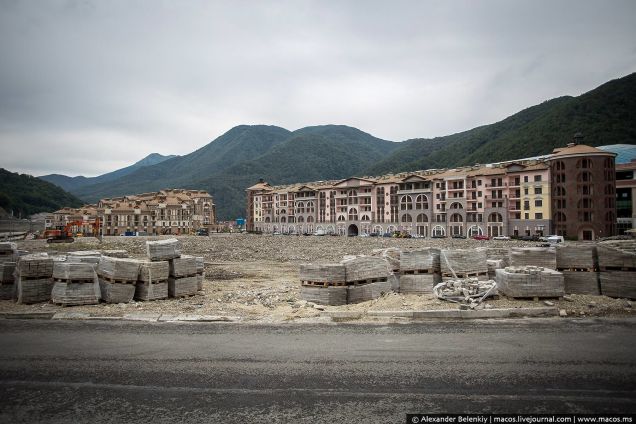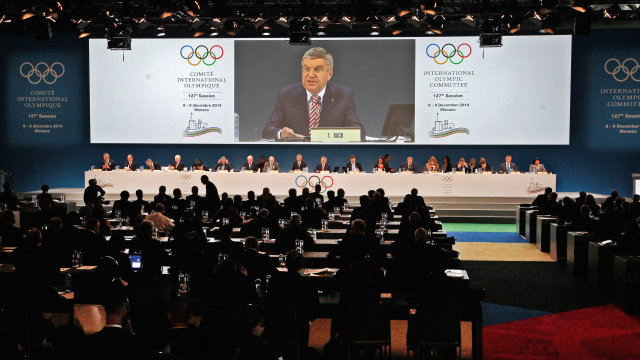With few cities willing to host them, the Olympics are in trouble. And with ongoing allegations of fraud and incompetence, the International Olympic Committee is in even more trouble. Today, the IOC approved dozens of new rules that attempt to address the expense and mismanagement of the Games.
The new guidelines are expansive — suspiciously so — and they range from allowing multiple cities or even multiple countries to host the same Olympics, to cutting down on the cost of bidding to host at all, to new rules for auditing and transparency within the IOC. It’s easy to see why the IOC wants the world to know it’s changing.
The last few years have seen a seemingly endless parade of outrageous stories about corruption and mismanagement from within the IOC. And from without, there’s been the growing international objections to the extraordinary financial burden the Games — and even just the bidding process for the Games — puts on cities.
And so last month, the IOC published a document (PDF) in advance of its yearly meeting details a plan called 20+20, in which it described 40 different recommendations for how the organisation could improve. At the IOC’s 127th annual session this weekend, every single recommendation was approved unanimously — according to the IOC, there were zero votes against any of the items, though the Chicago Tribune reports that there were clearly members who did not raise their hands during voting.
Making It Cheaper and Easier to Host
What’s the IOC so desperate to change? First of all, the way cities host the games. The IOC will now guide potential host cities through the process, and “actively promote the maximum use of existing facilities and the use of temporary and demountable venues,” a nod to the horrendous effect the Olympics have had on past host cities’ financial and urban health. Going even further, the IOC will also allow hosts to split events between multiple cities within a country — and if it’s necessary, host some events in entirely different countries.
So if a country didn’t have the ski jump necessary to hold the event, they could appeal to a neighbouring country or city to host it. It’s a model that looks more like the World Cup, where multiple cities split the burden, and it could open the door to the Olympics behind held in, say, New York City and Philadelphia, or Los Angeles and San Francisco.

Rosa Khutor, an area near Sochi that hosted Olympic venues. Picture: Alexander Belenkiy
The idea is to make it less financially taxing to build venues and space for every single event in a single city, and the IOC says it will also help cities balance “long-term investment in infrastructure and return on such investment on the one hand, and the operational budget on the other hand,” ostensibly to avoid the kind of budget overruns seen in the Sochi Olympics, which went more than $US40 billion over budget building infrastructure and venues — the long-term urban benefit of which still remains to be seen.
We’re Green, We Swear
As you read further into the long list of promises the IOC is making, you’ll notice a core theme: sustainability. The IOC is also making it cheaper to bid at all, cutting down on the meetings and sessions the cities must pay for during the bidding process. It’s also pledging to completely change how the Olympics are organised to make the process more sustainable: Not only by letting cities and countries share the burden and promoting reusable venue design, but by putting a cap on the number of athletes and events in each year’s games and monitoring labour standards, which have been an issue at Brazil’s Olympic venue sites, below.

Rio’s Olympic Village under construction. Picture: AP/Leo Correa
The IOC will “include sustainability in its day-to-day operations,” it says vaguely, and “integrate and implement sustainability measures that encompass economic, social and environmental spheres in all stages of their project.” What’s more, it’s pledging to be far more transparent with its dealings, auditing its financial records to International Financial Reporting Standards and requiring the IOC to “produce an annual activity and financial report, including the allowance policy for IOC members.”
If it feels like a whole lot to promise, that’s because it is. In the end, the list is an ambitious attempt to fix some of the IOC’s most high-profile missteps over the past few years. Whether or not the committee ends up overhauling the way it spends money and governs itself, the new rules for how cities compete to host the Games are a long-overdue step towards making the Olympics a worthwhile investment for cities — something they haven’t been for a long, long time.
Picture: AP Photo/Lionel Cironneau
